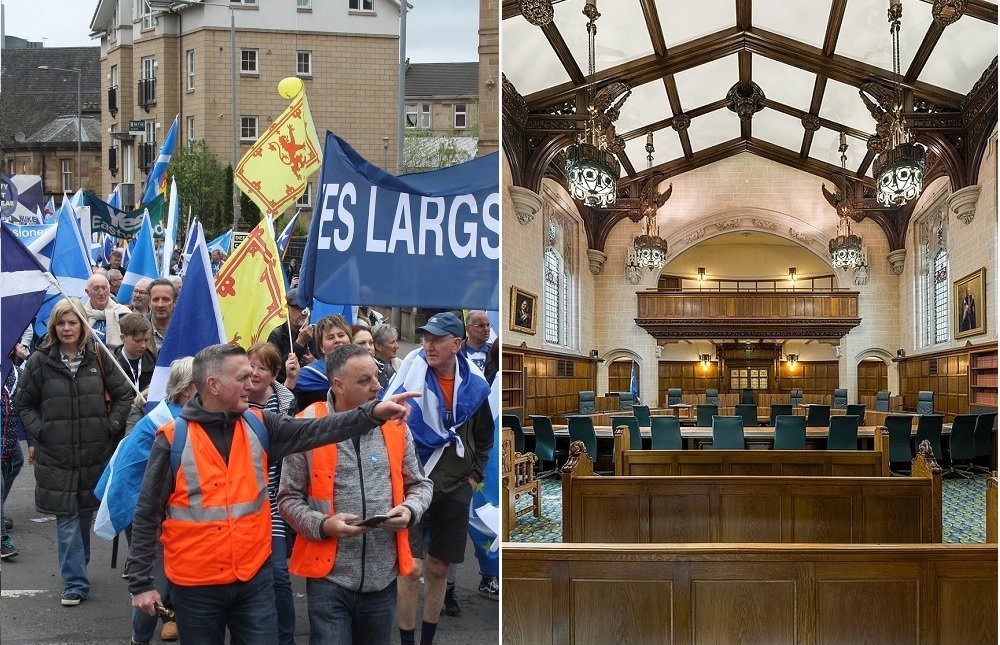Supreme Court hearing on independence referendum case to begin today

Judges at the UK Supreme Court are to begin hearing arguments in a case which could allow the Scottish Parliament to legislate for a second referendum on independence.
On Tuesday morning, the panel of five justices will start hearing evidence from the Scottish Government.
The case if decided in the Scottish Government’s favour could also set a precedent for other nations of the UK if they launched a future bid for independence from Westminster, including Wales.
Two days have been set aside for the hearing at the Supreme Court in London, with the UK Government expected to respond on Wednesday.
The case concerns proposed legislation at the Scottish Parliament called the Scottish Independence Referendum Bill.
Judges have been asked to decide whether the Bill relates to “reserved matters” – meaning it is outwith Holyrood’s competence.
Nicola Sturgeon asked the Lord Advocate, Scotland’s chief law officer, to refer the Bill to the Supreme Court when she published the legislation in June.
This was in order to head off any legal challenge from her opponents, with the First Minister saying she wanted an “indisputably lawful” referendum to take place.
The UK Government, represented in the court by the Advocate General, is opposed to a second referendum.
The Advocate General has argued in written submissions that a referendum plainly relates to reserved matters and is outside Holyrood’s legislative competence.
He has also asked the court to rule on whether it has jurisdiction to hear the case, saying the Bill has not yet been introduced to the Scottish Parliament.
‘Optimistic’
At the weekend, the First Minister spoke to journalists about the upcoming case while attending the SNP conference in Aberdeen.
Asked if she was confident the Supreme Court will grant Holyrood the ability to hold a second referendum, Ms Sturgeon said: “I am very hopeful and optimistic of that.
“But anybody who knows anything about court hearings would know that there’s not a lot of point trying to second-guess a court or speculate about the court’s outcome.”
The five Supreme Court judges who will hear the case are Lord Reed, Lord Lloyd-Jones, Lord Sales, Lord Stephens and Lady Rose.
While there is no set time for the judgment to be issued, it could be weeks or months away.
Lord Hope, a former deputy president of the Supreme Court, has suggested such a decision could take six to eight weeks.
A Scottish Government spokesman said: “There is a substantial majority in the Scottish Parliament in favour of an independence referendum and therefore a clear democratic mandate.
“However, as the First Minister has set out, there remains debate over whether the Scottish Parliament has the powers to legislate to hold a referendum.
“Referring this question to the Supreme Court is intended to achieve legal clarity on this point.
“The Scottish Government hopes that a referendum will be deemed to be within the legislative competence of the Scottish Parliament and that is now a matter for the Supreme Court to decide.”
‘Competence’
A UK Government spokesman said: “People across Scotland want both their governments to be working together, focusing on the issues that matter to them, not talking about another independence referendum.
“On the question of legislative competence, the UK Government’s clear view remains that a bill legislating for a referendum on independence would be outside the legislative competence of the Scottish Parliament.
“We will set out our arguments in full at the Supreme Court hearing.”
Support our Nation today
For the price of a cup of coffee a month you can help us create an independent, not-for-profit, national news service for the people of Wales, by the people of Wales.






Whatever happened to OBON Day 2022? One Britain One Nation? (You remember the catchy song of Der Brexiteer Jungevolk? “We are Britain and we have one dream! …)
Correct me if I’m wrong, but I can’t think of a single country that gained independence from England without blood shed, excepting Australia New Zealand etc. Africa, India, and Cyprus are typical of countries that had to fight a bloody war to gain their freedom. Now there is an opportunity for Scotland to lead a bloodless revolution and they will try to prevent their legitimate asperations regardless of the cost.
Malta? Wasn’t Singapore’s independence relatively peaceful as well? I don’t think it’s helpful to talk about bloodshed and potentially scare people off from seeking political change through democracy. We should all aim and strive for independence through peace and cooperation but bottom line is, whether through diplomacy or war, Britain has never been able to hang on to anywhere without the support and consensus of the majority population. This goes for India, the United States, Ireland as well as Singapore and modern-day countries leaving the commonwealth. Wales was the outlier in 1282, because the army was vastly outnumbered and the… Read more »